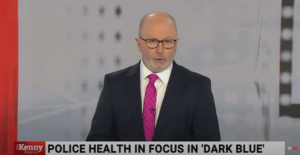Overview
The Biology of Trauma
An explanation of what happens in the body when we experience stress and how that relates to the ‘mind/body’ connection. We often think we can control the mind by being resilient however what really happens when the body does what it is build to do by our biological fight/flight/freeze stress response?
Burnout, the ingredients that cause stress
An outline of stressors that come with the job to assist in understanding why police are under the pump and the way triggers impact reaction versus response. This includes how the organization impacts police resilience.
The medical model verses person centred care
An explanation of the differences between psychiatry, psychotherapy and counselling to assist police and their families to understand the appropriate care to support their individual needs by making an informed choice.
Talking about Suicide
A sensitive conversation around suicidal ideation, which is an ultimate challenge for us all, how this can manifest and what to do if you, a family member, friend or colleague is struggling.
Reaching out for help
What are the options and how can we empower ourselves to live our best life.
Emotional awareness for managers
Information around how to identify and approach staff who are showing signs of burnout. A look at language and sensitivity when speaking with team members and how to use a person-centred approach rather than the penal system.
The role of Chaplains
An open discussion regarding the work of police chaplains and chaplaincy in general and how chaplains can be of support to serving and former police as well as how they assist and support families. This can include assisting when mental health issues arise as well as family crises, relationship breakdown and where there is illness or a death in the family.
Step-By-Step
Mental health professional support
Your doctor can refer you to mental health professionals including:
• psychiatrists
• psychologists
• counsellors
• social workers
• occupational therapists.
You can read about the different types of mental health professionals on the health direct website.
You can also use their find a health service tool to find one near you.
A mental health treatment plan lets you claim up to 20 sessions with a mental health professional each calendar year.
To start with, your doctor or psychiatrist will refer you for up to 6 sessions at a time. If you need more, they can refer you for further sessions. Health professionals set their own fees, so we may only cover some of the cost. Ask how much you’ll pay and what you’ll get back from us when you make your appointment. If they bulk bill, you won’t have to pay anything. If you have private health insurance, you may be able to get some money back. You can check with your insurer.
Help with costs
A mental health treatment plan lets you claim up to 20 sessions with a mental health professional each calendar year.
To start with, your doctor or psychiatrist will refer you for up to 6 sessions at a time. If you need more, they can refer you for further sessions. Health professionals set their own fees, so we may only cover some of the cost. Ask how much you’ll pay and what you’ll get back from us when you make your appointment. If they bulk bill, you won’t have to pay anything. If you have private health insurance, you may be able to get some money back. You can check with your insurer.
Rural and remote support
If you live in a remote area, it might be hard to see a mental health professional. You may be able to have a telehealth video consultation instead. You can claim for video consultation sessions with a mental health professional.
Ask your GP or mental health professional if they offer this service. You can also search the find a health service tool on the healthdirect website for mental health telehealth services.
Content for pathways to help
 15 Nov 2022
15 Nov 2022
Meditation links
Meditation is a practice of quietening the mind, letting go of thoughts and feelings and a way of observing ourselves without judgement or fear. It allows our busy minds a space to relax and replenish while opening avenues to tap into our intuition, creativity and spirituality.
 17 Nov 2021
17 Nov 2021
Mensline Australia
Mensline Australia offers 24/7 counselling support via telephone and online to men across Australia. Resources and information is also available to enhance relationships, help with addictions, understanding anxiety, separation and divorce and dealing with general stress.
 15 Nov 2022
15 Nov 2022
Mental health and wellbeing strategy for first responders
This strategy sets out the commitment of NSW first responder agencies to promote and protect the mental health and wellbeing of their staff and members. It represents a consensus among the agencies about what is required to meet this obligation.
 27 Sep 2023
27 Sep 2023
Mentality Plus
Mentality plus is run by Craig Semple who is a former police officer with lived experience of PTSD and associated mental health conditions. He is fully accredited and culturally sensitive to police and provides mental health first aid training and programs to create mentally healthy and resilient workplaces, mental health motivational presentations, workplace health and wellbeing programs and mental health and resilience for students.
 03 Mar 2023
03 Mar 2023
Michelle Robertson – Clinical Psychologist
Michelle has many personal qualities and qualifications that make her the psychologist that she is - being curious, investigative, logical, practical, empathetic, friendly, positive, hopeful, having the ability to understand many perspectives, values, likes and connects with people easily, has life experience, and is able to see the positives and strengths within everyone.
 17 Nov 2021
17 Nov 2021
Mind Health Connect
Mind Health Service Connect Line provides free telephone counselling and resources for people residing in the Hunter New England and Central Coast areas specifically covering mental and physical health as well as social support services.
 07 Feb 2025
07 Feb 2025
Mind Over Matter Practice
At Mind Over Matter Practice, we use science-backed therapies to support mental resilience, mood regulation, and brain function by influencing key neurotransmitters and stress pathways.
 30 Mar 2022
30 Mar 2022
My Aged Care
My Aged Care, established by the Australian Government, can help you find and access the right government-funded aged care services.
 17 Nov 2021
17 Nov 2021
National Centre for Childhood Grief
The National Centre for Childhood Grief provides unlimited free counselling for children aged 3 to 18 years and pay for service counselling for adults living with grief and bereavement. Services are available at ‘A Friends Place’, located in Denistone East, Sydney NSW.
 29 Jul 2022
29 Jul 2022
National Police Memorial
Established in 2001 the Memorial pays tribute to Australian Police Officers who have been killed on duty or have died as a result of their duties
 14 Nov 2022
14 Nov 2022
National State Police Insurance and Workers Compensation Providers
Serving police in each state pay into individual state insurance, workers compensation, superannuation and income protection schemes. Assistance during times of injury, Illness, death, or career transition are available by contacting your appropriate state provider.
 14 Nov 2022
14 Nov 2022
National State Police Jurisdictions Mental Health Services and Programs
Each individual state police jurisdictions will have mental health services for serving police which should include an Employee Assistance Program (EAP) along with other specific services. This may include EAP for transitioning police, former police up to 12 months and services for families. Career Transition services may also be included in some jurisdictions as moving into a new career after serving in the police force impacts mental health outcomes.
 14 Nov 2022
14 Nov 2022
National State Police Legacy
Police Legacy provide professional and compassionate support to families who have suffered a loss through the provision of benefits and services. Children who have lost a parent may benefit from camps, scholarships, trust funds and regular social engagement which is also extended to partners and parents. Each jurisdiction has independent services which may differ from state to state.
 14 Nov 2022
14 Nov 2022
National State Police Retired Associations and Support Networks
Staying connected to the police family by joining your local retired and former police association may be helpful in maintaining social connection and positive mental health outcomes. Each state jurisdiction has a retired and former police association where regular monthly meetings and social events assist with staying in touch with former colleagues.
 14 Nov 2022
14 Nov 2022
National State Police Unions
All Australian Police jurisdictions have Police Unions who provide Industrial Relations, Financial and in some state’s welfare and mental health support and services. Assistance for issues relating to workers compensation, legal matters, necessitous circumstances, and career transition may also be available through your state union. Associate membership for former officers is another way to stay connected to support and services post policing
 04 Jan 2022
04 Jan 2022
New Safe Haven service for Illawarra and Shoalhaven to help those in suicidal crisis
For people who are in crises this safe haven offers a drop in centre staffed by peer workers as an alternative to attending Hospital.

 Exit
Exit




